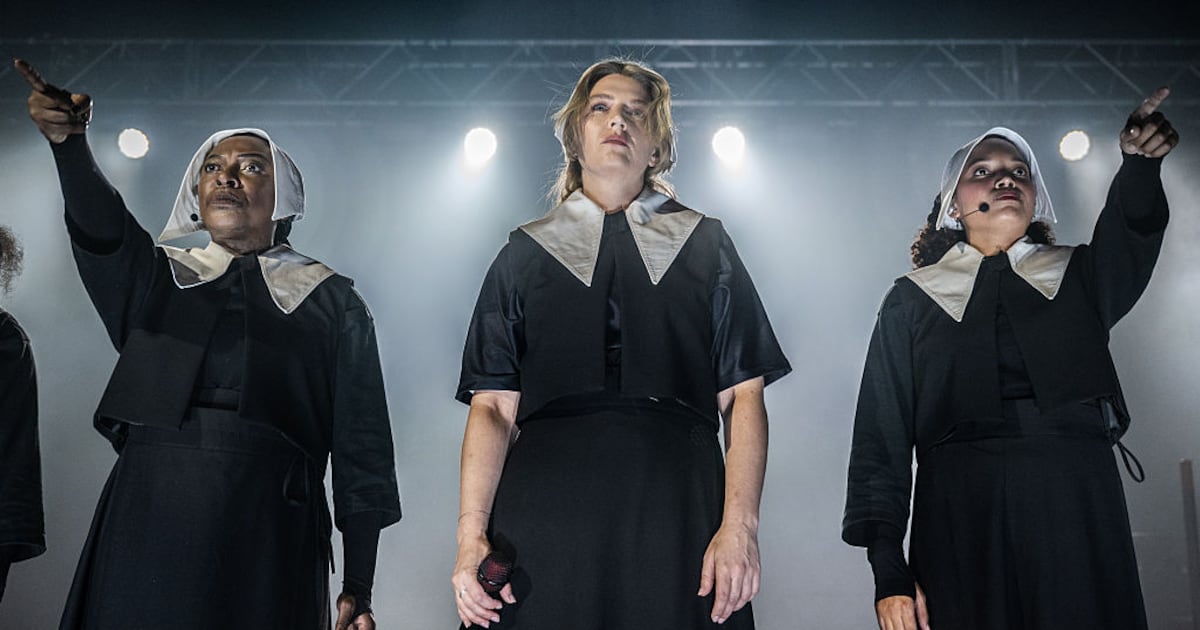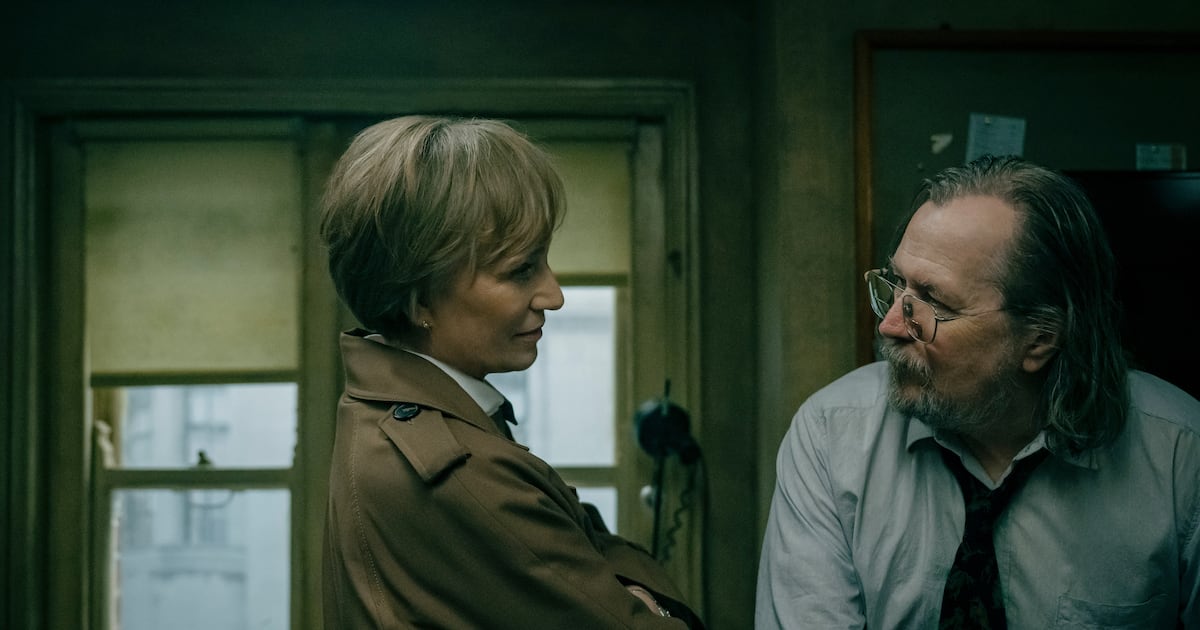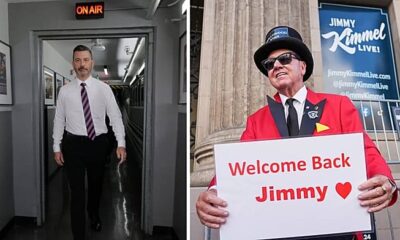Culture
Self Esteem in Dublin review: A masterclass in pacing and performance that leaves the room buzzing

Read more on post.
Self Esteem
3Olympia Theatre
★★★★★
Thursday night at 3Olympia Theatre begins riotously. Moonchild Sanelly opens with a set that feels less like a warm-up and more like a party already in full swing. There are bubbles, singalongs, and plenty of ass-flaunting. Her energy is irreverent, playful, and irresistibly fun. At one point she launches into a song about falling in love, starting therapy, and swearing off tequila, only to confess that the abstinence, like the love affair, was short-lived. She’s back to her usual form, and the audience is all the happier for it.
The mood shifts as Self Esteem takes the stage. Rebecca Lucy Taylor emerges with eight backing singers, all dressed in Puritan costumes: long black gowns, stark white collars and bonnets gleaming under minimalist stagelights. The tableau is eerie, particularly when the dancers begin to twitch and spasm one by one, as if possessed. “For the next 60 minutes, you belong to us,” she announces.
The opener, I Do and I Don’t Care, is a sweeping choral piece that crests with the question: “If I’m so empowered, why am I such a coward?” The line feels like a mission statement, an inquiry into empowerment feminism from the inside. Taylor grapples with its uneasy comedy, shifting between soaring pride and biting self-contempt, reaching for glimmers of pure optimism from inside a broken life. Even when chanting feel-good feminist platitudes, it’s impossible not to detect quiet irony, though never mockery. She truly wants to believe, and that’s what makes her so interesting.
Beneath their bubbly surface, her pop songs hide a volcanic emotional terrain, shifting unpredictably between vulnerability, defiance, and absurdity. As she sings on F**king Wizardry: “Part of being funny is having some sincerity and using both of them wisely.” Her lyrics are clever in a dry, understated way. On alcohol: “I wouldn’t do it if it didn’t work, but it really f**king works, and that’s the curse.” On love: “When I’m buried in the ground I won’t be able to make your birthday drinks but I will still feel guilty.”
The show unfolds with immaculate pacing and attention to detail. Each shift is both surprising and deliberate: a glimpse of black-and-white boxing shoes under Puritan gowns signals the move into gym kit and more aggressive choreography. High-energy numbers give way to moments of intimacy. In one memorable sequence, she picks up a banana, dials it like a phone, and leaves a voicemail for a lost lover before peeling and eating it. There’s a breathtaking a cappella interlude performed in near darkness, an appearance in an Irish jersey, a brass flourish, and a weird voodoo bit where “Ben” and “Eddie”, presumably two scumbag ex-boyfriends, are summoned.
By the time the final notes fade, the audience is on its feet, the room buzzing with applause. The set is rich, dense and dynamic, a masterclass in pacing and performance. Taylor has transformed her intimate, highly specific songs into an immersive experience. Vision and execution, perfectly matched.
Culture
Slow Horses review: Dour, dumpy and depressed, is this the broken Britain of spy dramas?

Read more on post.
Much like an expensive gadget you never get much use from, Apple has ploughed billions into its streaming service, Apple TV+, without yet arriving within tweeting distance of a viral hit.
The closest it has come is the insufferable Ted Lasso, a psychotically cuddly comedy about soccer aimed at and seemingly made by people who have never attended a match in their lives.
The second closest is the rumpled espionage dramedy Slow Horses (Apple TV+, Wednesday), which has received admiring reviews – mainly from the UK, it must be said – for portraying the operatives at MI5 as relatable weirdos rather than gimlet-eyed instruments of British foreign policy.
Something is going on here. Every country likes to hold up a mirror and see something that it likes about itself in the reflection. It surely says a lot about the Britain in the 21st century that it would rather be represented by wisecracking underdogs than by a mercurial womaniser such as James Bond. Dour, dumpy, depressed: is this the broken Britain of spy dramas?
The other question is whether it’s worth the acclaim. Sort of – though the series’ charms are not immediately obvious as it returns for a fifth season. The major obstacle is Gary Oldman. He plays a rude slob named Jackson Lamb, whom the show insists we find completely charming.
He’s actually just a rude slob – and a bit of a boss from hell, given that he is in charge of a team of spooks at MI5’s Slough House, a dumping ground for underperforming agents.
The stewing Lamb aside, Slow Horses reels you in with an enjoyably crunchy plot that owes a lot to the master of ennui and espionage, John le Carré. It begins in a grim corner of London, as a progressive mayor from a southeast Asian background seeks re-election over a red-faced far-right headbanger.
So far so depressingly true to life. But things take a turn for the mildly fantastical when a crazed gunman goes on a shooting spree – with a campaigner for the mayor among his victims. Meanwhile, back at Slough House, the team’s in-house hacker, Roddy Ho (Christopher Chung), has seemingly been targeted for elimination.
But why? That is one of the mysteries confronting Lamb and his dashing sidekick River Cartwright (Jack Lowden – who is actually in the conversation as the next Bond). Alas, every step of the way they find obstacles laid in their path by their spiky boss, Kristin Scott Thomas – once again impersonating Theresa May.
Slow Horses excels at capturing the grey vastness of modern London, and the plot is packed to bursting, but it can’t decide whether it wants to be hilarious or profound, and the humour comes across as trying too hard.
The show’s fast-expanding fan base will tell you it’s the best thing on TV, but newcomers will find Slow Horses less hot to trot than a bleak black sheep that ambles at its often wayward pace.
Culture
Ticketmaster commits to greater price transparency after Oasis sale

Read more on post.
The British competition watchdog has secured formal commitments from Ticketmaster in the UK to ensure greater transparency when it comes to the future sale of concert tickets there.
It comes following a lengthy investigation carried out by the Competition and Markets Authority (CMA) launched in the wake of a ticket-pricing controversy that erupted after Oasis reunion concert tickets went on sale last September.
Following the investigation, the CMA found that Ticketmaster did not tell fans waiting in lengthy queues that standing tickets were being sold at two different prices, and that prices would jump as soon as the cheap tickets sold out.
Ticketmaster also sold some “platinum” tickets at almost 2½ times the price of “standard” tickets – without sufficient explanation that these offered no additional benefits over some “standard” tickets in the same areas of the venue.
What has been described as “dynamic ticket pricing” was also used for the band’s Croke Park concerts and saw some fans paying more than three times more for the same tickets as other fans who were ahead of them in the queue.
A similar investigation is being carried out by the Competition and Consumer Protection Commission in Ireland and a spokeswoman confirmed to The Irish Times that it was still ongoing.
“The CCPC is actively investigating Ticketmaster Ireland and its handling of the sale of Oasis tickets on the weekend of August 31st, 2024,” she said. “As the investigation is still ongoing, no further comment can be made at this time.”
As part of the agreement Ticketmaster in the UK will tell fans 24 hours in advance if a tiered pricing system is being used (as it was for Oasis standing tickets). This means fans will know beforehand if there are multiple prices for the same type of ticket, and that more expensive ones will be released once the cheapest sell out.
It will also provide more information about ticket prices during online queues, helping fans anticipate how much they might have to pay.
The range of prices available for the event will be set out when people join the queue and fans will be updated swiftly when the cheaper tickets sell out.
And the platform has also agreed not use any misleading ticket labels and ensure that tickets are described accurately and do not give the impression that one ticket is better than another when that is not the case.
Ticketmaster will regularly report to the CMA how it has implemented the undertakings over the next two years to ensure robust compliance. Failure to take forward these measures could result in enforcement action.
Sarah Cardell, the chief executive of the authority, said that “fans who spend their hard-earned money to see artists they love deserve to see clear, accurate information, upfront.
“We can’t ensure every fan gets a ticket for events as popular as the Oasis tour, but we can help ensure that next time an event like this comes along, fans have the information they need, when they need it,” she said.
She said the undertakings “have been provided to the CMA voluntarily and without any admission of wrongdoing or liability. Ticketmaster has stopped using ‘platinum’ labels in the UK, separate to providing undertakings.”
The CMA added that while “many fans were under the impression that Ticketmaster used an algorithmic pricing model during the Oasis sale – with ticket prices adjusted in real time according to changing conditions like high demand – also known as dynamic pricing – the CMA has not found evidence that this was the case.”
Ticketmaster Ireland have been approached for a comment.
Culture
House of Guinness on Netflix review: Wildly unfaithful retelling is like Succession with shillelaghs

Read more on post.
Netflix has pitched House of Guinness (Netflix, from Thursday) as a sort of Succession with shillelaghs. It begins with the death, in 1868, of Benjamin Guinness, grandson of the brewery’s founder, Arthur Guinness. As with the acclaimed HBO show, the story is driven by his dysfunctional children, all of whom have various designs on his beer empire.
There are many negatives, so perhaps it’s best to focus on the positives up top. First, the music is fantastic. An early “Fenian” riot in Dublin is soundtracked by Kneecap’s Get Your Brits Out, a pairing so on the nose I could feel my nostrils climb up into my skull. Elsewhere, the score features such up and coming Irish artists as Fontaines DC, Gilla Band, Shark School, Lankum, The Scratch and Sprints.
Fontaines don’t need the exposure. But how fantastic that, to pluck a random example, Gilla Band’s weapons-grade postpunk is about to be beamed into livingrooms across the globe. There is also an undeniable thrill of witnessing Irish history told in epic-budget fashion.
But that’s about as good as it gets. One problem with House of Guinness is the at best rudimentary understanding of Ireland’s experiences of colonialism of Steven Knight, the drama’s creator. (He didn’t even have to leave the UK: the series was filmed mainly in Liverpool.)
He pitches the struggle for independence as a battle between different kinds of Irish people. On one side are Dublin Metropolitan Police units with flint urban burrs, on the other “Fenians” who dress and speak like feral leprechauns. At no point in an eight-part series unfolding in a post-Act of Union Ireland do we encounter a single person with a British accent – which Americans might call burying the lede.
Knight is responsible for one of the worst television shows of all time, in the atrocious Peaky Blinders – starring Cillian Murphy’s flat cap and Nick Cave’s Red Right Hand and not much else. (No man has ever loved anything so much as Knight does Murphy’s hat.) So there are obvious concerns now that he is getting his mitts on 19th-century Irish history with House of Guinness, a wildly unfaithful retelling of the adventures of the porter-fuelled Anglo-Irish dynasty at a time when Ireland was a powder keg primed to detonate.
He also has a stunning lack of appreciation for who the Anglo-Irish were and where they fit (or didn’t) into Irish society. To Knight, all the Irish seem much the same; the Guinness dynasty and their peers are just that little bit posher. For instance, as played by the Dublin actor Danielle Galligan, Lady Olivia Hedges, daughter of the Earl of Bantry, is depicted essentially as a middle-class Cork woman.
Still, she and the rest of the cast do their best. James Norton sounds like a steampunk Mr Tayto as the Guinness consigliere Seán Rafferty. As the sensible one in the family, Edward, played by Louis Partridge (boyfriend of Olivia Rodrigo), appears to have walked straight out of a Ross O’Carroll-Kelly spin-off. Forget the black stuff: Edward was born to chug Heinomites. There is also Anthony Boyle as the closeted head of the family, Arthur Guinness, Jack Gleeson as their illegitimate half-sibling, Byron Hughes, and Emily Bairns as Lady Anne Guinness.
In one of the more unintentionally hilarious sequences, Ms Guinness visits a village in “Connacht, Co Mayo”, and is shocked to discover that a famine took place several years earlier and that everyone speaks Irish. These and other scenes might leave you crying out for a nice cold, creamy pint of Beamish.
-
Culture2 days ago
Taylor Swift’s new cinema outing generates more than €12million in just 24 hours
-
Environment1 week ago
Chimps drinking a lager a day in ripe fruit, study finds
-
Politics2 days ago
European Parliament snubs Orbán with vote to shield Italian MEP from Hungarian arrest
-
Culture2 weeks ago
Life, loss, fame & family – the IFI Documentary Festival in focus
-
Health3 days ago
EU renews support for WHO’s Universal Health Coverage Partnership
-
Culture2 days ago
Twilight at 20: the many afterlives of Stephenie Meyer’s vampires
-
Environment5 days ago
Key oceans treaty crosses threshold to come into force
-
Culture2 months ago
Fatal, flashy and indecent – the movies of Adrian Lyne revisited












































